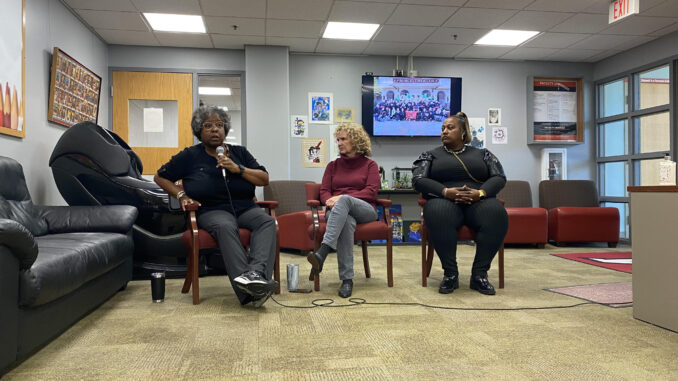
By Ana Diaz —
Recently, a group of students and faculty gathered in Rentschler Hall at Hamilton to discuss the subjects of women and religion. This was a part in the Faculty Unhinged series, where various current and former faculty members get together to discuss contemporary topics of relevance. During this particular Faculty Unhinged session, students and faculty addressed the role that women play both in and out of the church.
Shaquila Matthews, a community activist and criminal justice major, was there to speak, as was Tarah Trueblood, a staff member at Oxford with a background in law and interfaith work. Pastor Vanessa Cummings was also in attendance, who, in addition to her work at the church, is involved in social justice and activism.
The first question asked the speakers to examine ways in which religion is important to them. There was significant emphasis on community in several responses. As Tarah Trueblood put it, she was “forged in a religious home and community.” Though she is not currently involved with any church denomination, she says her sense of faith and her basic guiding values and principles come from the religious community she was part of as a child.
According to Shaquila Matthews, it’s “what I lean towards during bad, good, and confused times.” She said that her religion is always there for her, no matter what life throws her direction. However, as Pastor Cummings put it, it’s her “faith more than religion” that is important to her. “Faith holds me together,” she said, and keeps her motivated and grounded.
While it seems that religion has done much good for the speakers, there is no denying the troubled history the church has in its treatment of women. Even now, there is debate in some Christian denominations over whether to allow women to access senior positions in the church.
The next question posed to our guest was: Considering the things done in the name of the church, and the patriarchal structure of it, where should women fit in? Where do they fit in now?
Many audience members seemed to have their own personal experience with the church discriminating against women, or knew of examples of it holding on to antiquated values that seem to do more harm than good.
Tarah Trueblood discussed her experience as a kid growing up, struggling with the patriarchy and inequity in her church. She went to a seminary rooted in social justice, but afterwards still “struggled to put the pieces back” in a satisfying way to her. She felt ultimately let down by a religion that was “forged in a system of patriarchy.” So, she’s reconstructed her belief system, which is guided by principles of equity and inclusion. But, she said, she’s grateful to her roots for showing her what’s important to her.
Vanessa Cummings and Shaquila Matthews had similar stories of struggles, especially as Black women. As a female pastor, Vanessa sees this discriminatory attitude often, but she said the “church is a microcosm of the macrocosm,” meaning that the church reflects the power structures of the greater society in which it resides. That means her work as an activist isn’t over; she’ll keep fighting for herself and those she cares about.
The church can seem like a “male-dominated club,” said Shaquila. That, too, just inspires her to keep doing the work that clearly still needs to be done. She acknowledged that women often don’t get the recognition they deserve for the roles they play in church and in society in general.
A recurring theme was the inconsistencies of how the church behaves and talks. It’s easy for people to say they’re accepting and open-armed, but there are countless stories of exclusion in the name of God. One member of the audience raised her hand and asked the following question: Given how angry [the guests] still were at the church for excluding them after coming out, was it hard to work with people who were still angry and hurt about what happened?
“The church hurt is real,” Vanessa said. But, as each of the speakers stressed, it’s about meeting people where they’re at—not bringing them to where you are. In their activism and faith work, the speakers ultimately want people to find peace in their spirituality and faith, and rediscover the values that mean the most to them.
Tarah Trueblood stressed the importance of building an inclusive, caring community, and surrounding oneself with people who can be loving while we embark on the process of healing from any hurt the church may have inflicted.
The speakers want you to know that there’s a place for you, whatever you believe, and whatever happened in the past. While there’s much work still to be done, there are still communities to be found that are open, caring, and inclusive. You don’t have to be alone.
